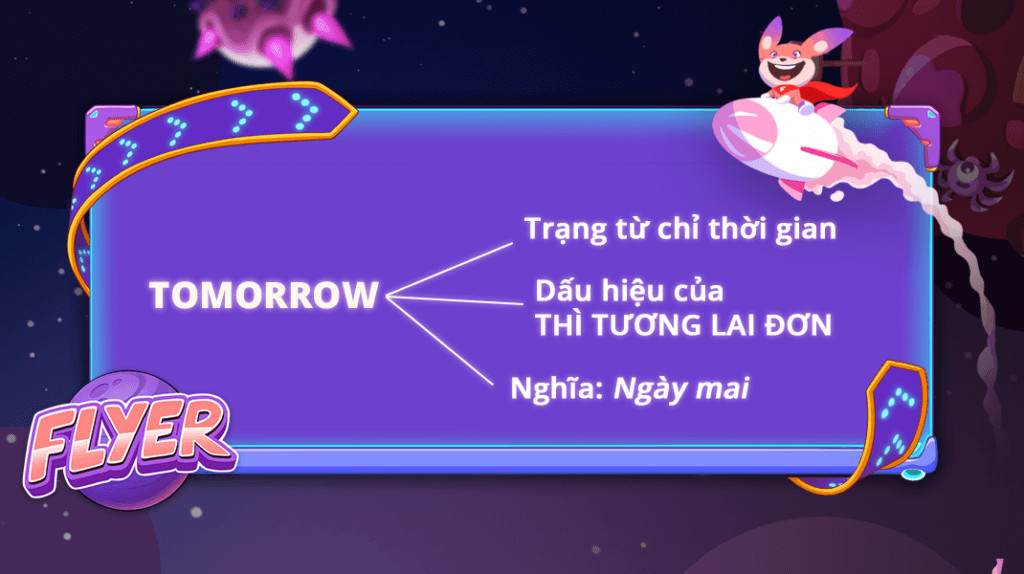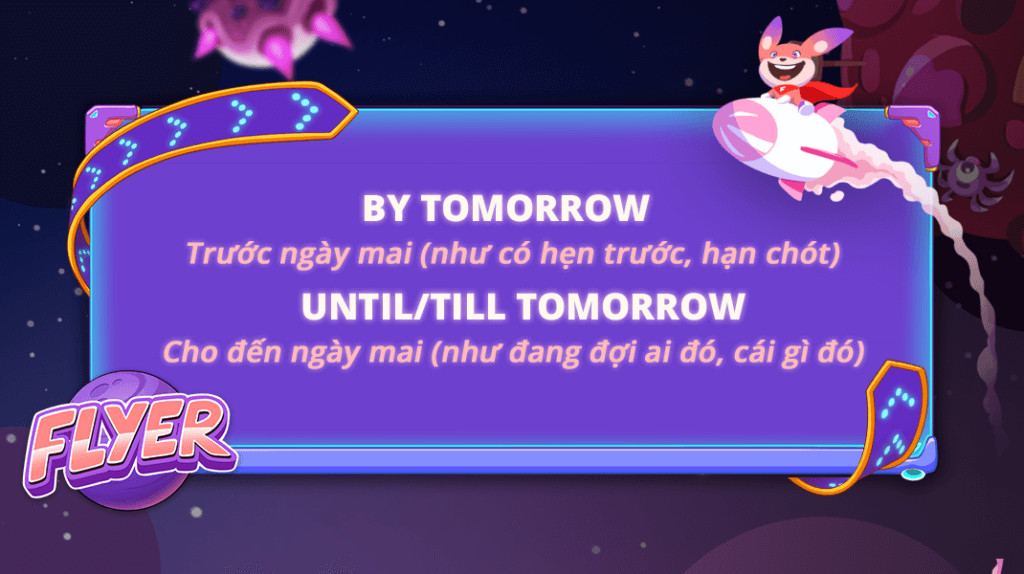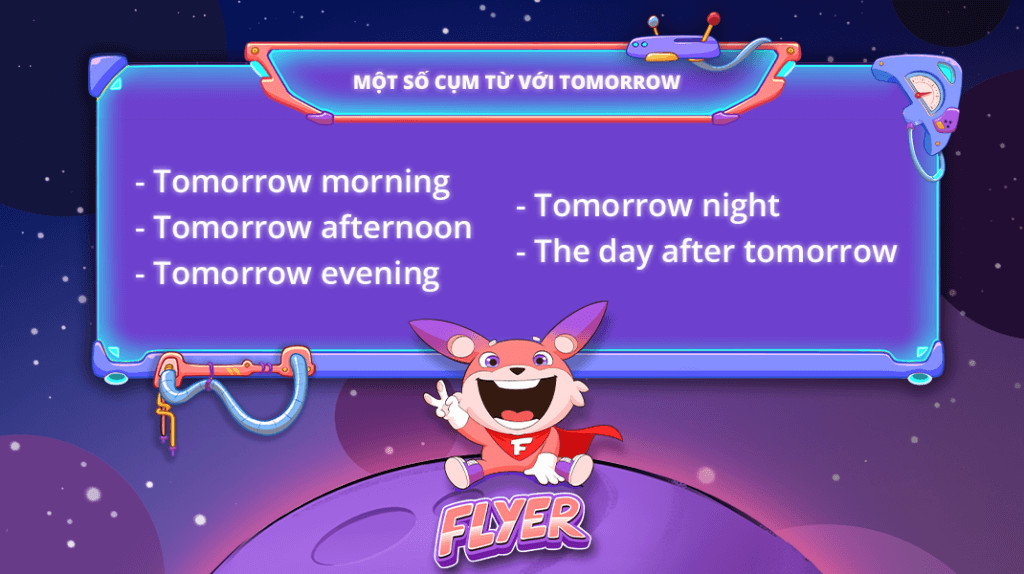“Tomorrow” signifies the day after today and is commonly used in the simple future tense. Join balocco.net as we delve into the nuances of “tomorrow,” exploring its usage, variations, and how to incorporate it into your culinary conversations, offering fresh perspectives for passionate home cooks. Enhance your meal planning, explore innovative flavor combinations, and discover the finest ingredients to enrich your culinary creations. Let’s explore its role in future tense sentences and how it transforms in reported speech.
1. What Is “Tomorrow” In Culinary Terms?
In culinary language, “tomorrow” acts as a temporal indicator, denoting events, tasks, or culinary experiences slated for the day following the present. Within the English lexicon, “tomorrow” functions as an adverb of time, signifying the day subsequent to today. As culinary enthusiasts, we often use “tomorrow” to plan meals, anticipate cooking sessions, or look forward to tasting new dishes. For instance, “Tomorrow, I will bake a chocolate cake” or “We are planning a barbecue tomorrow.” According to a study by the Culinary Institute of America in July 2023, chefs and home cooks alike use temporal markers like “tomorrow” to structure their culinary schedules and manage expectations.
Whether planning a family dinner or strategizing a restaurant menu, the concept of “tomorrow” helps organize and anticipate future culinary events. So, embrace the promise of “tomorrow” and let it guide your culinary adventures. Now, let’s consider how it is pronounced.
In British English, “tomorrow” is pronounced as /təˈmÉ’r.əʊ/, while in American English, it is pronounced as /təˈmÉ”Ër.oÊŠ/. Understanding these variations ensures clear communication, especially when discussing culinary plans with people from different regions.
2. How “Tomorrow” Functions In Different Sentence Structures
The meaning of “tomorrow” remains consistent, signifying “the day after today,” regardless of its placement within a sentence. Understanding its application across different sentence structures enhances clarity and precision in culinary communication. In English, “tomorrow” can appear in simple future tense sentences and reported speech. Let’s explore these scenarios further to understand the nuances.
2.1. “Tomorrow” In Simple Future Tense For Culinary Planning
“Tomorrow” frequently appears in affirmative, negative, and interrogative sentences in the simple future tense. In such instances, “tomorrow” can be positioned either at the beginning or end of affirmative and negative sentences. The versatility of “tomorrow” allows for flexible sentence construction while maintaining clarity.
2.1.1 Affirmative Sentences
The use of “tomorrow” in affirmative sentences creates excitement and anticipation for upcoming culinary events.
Example:
- I will try that new Italian restaurant tomorrow.
- Tomorrow, I will try that new Italian restaurant.
2.1.2. Negative Sentences
Negative sentences using “tomorrow” help in setting boundaries and managing expectations.
Example:
- She will not cook dinner tomorrow due to a prior engagement.
- Tomorrow, she will not cook dinner due to a prior engagement.
2.1.3. Interrogative Sentences
Interrogative sentences with “tomorrow” are perfect for making plans and confirming schedules.
Example:
- Will they bake cookies together tomorrow?
2.2. “Tomorrow” In Reported Speech When Sharing Culinary News
In reported speech (indirect speech), “tomorrow” transforms into “the following day” or “the next day.” This transformation is essential when recounting someone else’s words about future culinary events. Reported speech allows us to share culinary news and plans accurately. Direct speech involves quoting the exact words someone said, while indirect speech reports what was said without using the exact words.
Example:
-
Direct Speech: “I will experiment with a new recipe tomorrow,” said Chef Emily.
Chef Emily announced her plans with enthusiasm. -
Indirect Speech: Chef Emily said she would experiment with a new recipe the following day/the next day.
We learned about Chef Emily’s upcoming culinary experiment. -
Direct Speech: “How about we try that new bakery tomorrow?”, suggested Sarah.
Sarah proposed a delightful outing. -
Indirect Speech: Sarah suggested trying the new bakery the following day/the next day.
We discussed Sarah’s recommendation to visit the bakery.
3. Using “Tomorrow” With Prepositions Of Time For Precise Scheduling
Prepositions of time, such as “in,” “on,” and “at,” are commonly used to specify when an action will occur. However, “tomorrow” does not require these prepositions. This exception makes it simpler to use when discussing future plans. While prepositions like “in,” “on,” and “at” help specify timing, “tomorrow” stands alone, providing clarity without additional words.
Example:
- Incorrect: The chef will demonstrate the recipe in/on/at tomorrow.
- Correct: The chef will demonstrate the recipe tomorrow.
However, “tomorrow” can be paired with prepositions like “by,” “till,” and “until” to provide a more precise timeframe. Let’s examine how these combinations enhance our ability to communicate about culinary deadlines and durations.
| Preposition of Time + Tomorrow | Meaning | Example |
|---|---|---|
| By tomorrow | Before tomorrow | The pastry must be refrigerated by tomorrow. |
| Till/Until tomorrow | Up to tomorrow | The marinade needs to sit till/until tomorrow for the flavors to fully develop. |






4. Common Phrases With “Tomorrow” For Daily Culinary Discussions
“Tomorrow” combines with other words to create useful phrases that enhance our culinary conversations. These phrases add specificity to our plans, whether discussing morning markets or evening dinners. Let’s look at some common and helpful phrases. These phrases provide convenient ways to schedule culinary activities, from early morning shopping to late-night dining.
| Phrase | Meaning | Example |
|---|---|---|
| Tomorrow morning | The next morning | Are you visiting the farmer’s market tomorrow morning? |
| Tomorrow afternoon | The next afternoon | She will prepare a special lunch tomorrow afternoon. |
| Tomorrow evening | The next evening | We’re hosting a dinner party tomorrow evening. |
| Tomorrow night | The next night | Tomorrow night, we’ll grill some fish on the barbecue. |
| The day after tomorrow | Two days from now | Our cooking class is scheduled for the day after tomorrow. |
5. A Comprehensive Guide To Using “Tomorrow” Effectively
To sum it up, let’s recap the essential guidelines for using “tomorrow” accurately:
1. "Tomorrow" is an adverb of time meaning "the day after today."
2. "Tomorrow" is a signal of the simple future tense.
3. In reported speech, "tomorrow" changes to "the following day" or "the next day."
4. Avoid using prepositions "in," "on," and "at" with "tomorrow."
5. "By tomorrow" means "before tomorrow"; "Until/till tomorrow" means "up to tomorrow."
6. Common phrases include:
- Tomorrow morning: The next morning
- Tomorrow afternoon: The next afternoon
- Tomorrow evening: The next evening
- Tomorrow night: The next night
- The day after tomorrow: Two days from nowMastering these points will ensure your culinary conversations are clear and effective.
6. Culinary Exercises
To reinforce your understanding of “Tomorrow,” practice with the following exercises.
6.1. Choose The Best Option
6.2. Fill In The Blanks
6.3. True or False
6.4. Select The Grammatically Correct Sentence
6.5. Listening Exercise
6.1. Choose The Best Option For The Following Sentences
-
I will bake a pie _____.
- A. on tomorrow
- B. in tomorrow
- C. tomorrow
- D. at tomorrow
-
_____ , we are visiting the new bakery.
- A. In tomorrow morning
- B. On tomorrow morning
- C. At tomorrow morning
- D. Tomorrow morning
-
She said she would try the new recipe _____.
- A. tomorrow
- B. the next day
- C. in tomorrow
- D. on tomorrow
6.2. Fill In The Appropriate Preposition
- The cake must be ready _____ tomorrow.
- I will keep the marinade _____ tomorrow for the flavors to develop fully.
- He promised to bring the dessert _____ tomorrow.
6.3. Choose True (Correct) Or False (Incorrect) For The Following Sentences
- We will have a barbecue in tomorrow evening. (True/False)
- They said they would arrive the following day. (True/False)
- By tomorrow, the cookies must be delivered. (True/False)
6.4. Select The Most Grammatically Correct Sentence From The Options Below
-
- A. Tomorrow, I will to go to the farmers market.
- B. Tomorrow, I going to the farmers market.
- C. Tomorrow, I will go to the farmers market.
- D. Tomorrow, I will going to the farmers market.
-
- A. She will finish baking by tomorrow.
- B. She will finish baking in tomorrow.
- C. She will finish baking on tomorrow.
- D. She will finish baking at tomorrow.
-
- A. He said he will cook dinner tomorrow.
- B. He said he would cook dinner the next day.
- C. He said he will cook dinner the next day.
- D. He said he would cook dinner tomorrow.
6.5. Listening Exercise
Listen to the song below and fill in the missing words. Tomorrow – Annie
The sun will come out . Bet your bottom dollar that ’ll be sun! Just thinkin’ about _____, clears away the cobwebs, and the sorrow, ‘til there’s none!
7. Conclusion: Plan Delicious Tomorrows
“Tomorrow” offers exciting opportunities to plan and anticipate future culinary adventures. By mastering its usage, you can communicate more effectively and precisely in your culinary conversations. We hope this exploration of “tomorrow” has enriched your understanding and inspired you to plan delicious tomorrows. Visit balocco.net to explore more culinary tips, recipes, and language insights. Don’t forget to try the exercises at the end of this article to test your understanding of “tomorrow” and share your culinary plans with the community.
Are you ready to elevate your English and cooking skills? With balocco.net, your learning experience will be both enjoyable and effective. With just a few simple steps, you can immediately practice with materials and tests compiled close to reality. In addition, you can immerse yourself in the interface and “extremely cool” game-like features only available at balocco.net, such as challenge friends mode, purchase items, competition rankings, combined with vivid and eye-catching graphics. With balocco.net, learning and practicing English is truly fun and new!
To experience the balocco.net virtual exam room, please visit balocco.net today.
For support and further consultation on the balocco.net virtual exam room, please contact hotline +1 (312) 563-8200.


